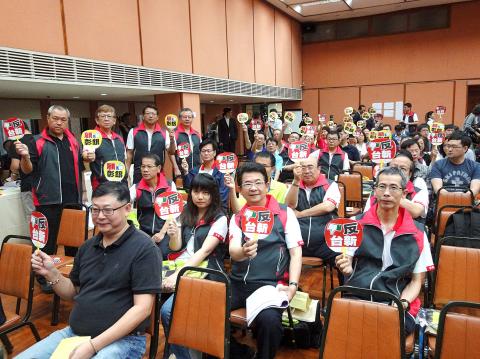Government-backed candidates and their allies yesterday won a majority of seats on state-run Chang Hwa Bank’s (彰化銀行) board, despite a High Court ruling that required the Ministry of Finance to help Taishin Financial Holding Co (台新金控) gain management rights in compliance with a 2005 agreement.
Taishin Financial expressed no surprise at the election result, which it attributed to the ministry’s intervention, and said the result undermined the government’s credibility.
The ministry welcomed the support of shareholders, saying it would continue to make sure the government’s stakes in companies would work to best protect the interests of all shareholders.

Photo: Lu Kuan-cheng, Taipei Times
It is now up to the Supreme Court to decide if the ministry remains obligated by a 2005 contract to yield management rights in Chang Hwa Bank to Taishin Financial, the largest single shareholder with a 22.5 percent stake.
The ministry had said the contract was valid only for the duration of the special shares Taishin Financial purchased in the state lender, but now argues that there was never any agreement.
All major policies that concern state-run financial institutions are subject to legislative oversight, but legislators never reviewed any agreement that asked the ministry to support Taishin Financial during Chang Hwa Bank board elections, Deputy Minister of Finance Su Jain-rong (蘇建榮) said on Monday after filing an appeal to contest the Taiwan High Court’s ruling last month in favor of Taishin Financial.
With the litigation ongoing, the parties involved did not need to allow the court’s ruling to affect the board election, National Treasury Administration Director-General Frank Juan (阮清華) said.
The court asked the ministry to help Taishin Financial win majority control of the state lender’s board unless either side sold its stake.
Government-backed candidates won three of six director seats and two of three independent director seats, Chang Hwa Bank announced.
Among them was Chang Hwa bank chairman Chang Ming-daw (張明道).
David Lee (李世聰), chairman of Lung Yen Life Service Corp (龍巖集團), the nation’s top funeral services operator, also won a seat after acquiring a sizeable stake.
Taishin Financial won two director seats and one independent director seat, not enough to reclaim the management rights from the ministry or dominate the lender’s boardroom.
“We did not really lose because we won the same number of seats this time as three years ago,” Taishin Financial said in a statement.
The ministry was not the winner because its intervention ran counter to the 2005 agreement, disregarded the Taiwan High Court ruling and had bankrupted the government’s credibility, it said.
“We are not surprised at the result because every time the government intervenes, it wins. It is a nightmare for all listed companies,” Taishin Financial said.

NATIONAL SECURITY THREAT: An official said that Guan Guan’s comments had gone beyond the threshold of free speech, as she advocated for the destruction of the ROC China-born media influencer Guan Guan’s (關關) residency permit has been revoked for repeatedly posting pro-China content that threatens national security, the National Immigration Agency said yesterday. Guan Guan has said many controversial things in her videos posted to Douyin (抖音), including “the red flag will soon be painted all over Taiwan” and “Taiwan is an inseparable part of China,” while expressing hope for expedited “reunification.” The agency received multiple reports alleging that Guan Guan had advocated for armed reunification last year. After investigating, the agency last month issued a notice requiring her to appear and account for her actions. Guan Guan appeared as required,

A strong cold air mass is expected to arrive tonight, bringing a change in weather and a drop in temperature, the Central Weather Administration (CWA) said. The coldest time would be early on Thursday morning, with temperatures in some areas dipping as low as 8°C, it said. Daytime highs yesterday were 22°C to 24°C in northern and eastern Taiwan, and about 25°C to 28°C in the central and southern regions, it said. However, nighttime lows would dip to about 15°C to 16°C in central and northern Taiwan as well as the northeast, and 17°C to 19°C elsewhere, it said. Tropical Storm Nokaen, currently

PAPERS, PLEASE: The gang exploited the high value of the passports, selling them at inflated prices to Chinese buyers, who would treat them as ‘invisibility cloaks’ The Yilan District Court has handed four members of a syndicate prison terms ranging from one year and two months to two years and two months for their involvement in a scheme to purchase Taiwanese passports and resell them abroad at a massive markup. A Chinese human smuggling syndicate purchased Taiwanese passports through local criminal networks, exploiting the passports’ visa-free travel privileges to turn a profit of more than 20 times the original price, the court said. Such criminal organizations enable people to impersonate Taiwanese when entering and exiting Taiwan and other countries, undermining social order and the credibility of the nation’s

‘SALAMI-SLICING’: Beijing’s ‘gray zone’ tactics around the Pratas Islands have been slowly intensifying, with the PLA testing Taiwan’s responses and limits, an expert said The Ministry of National Defense yesterday condemned an intrusion by a Chinese drone into the airspace of the Pratas Islands (Dongsha Islands, 東沙群島) as a serious disruption of regional peace. The ministry said it detected the Chinese surveillance and reconnaissance drone entering the southwestern parts of Taiwan’s air defense identification zone early yesterday, and it approached the Pratas Islands at 5:41am. The ministry said it immediately notified the garrison stationed in the area to enhance aerial surveillance and alert levels, and the drone was detected in the islands’ territorial airspace at 5:44am, maintaining an altitude outside the effective range of air-defense weaponry. Following